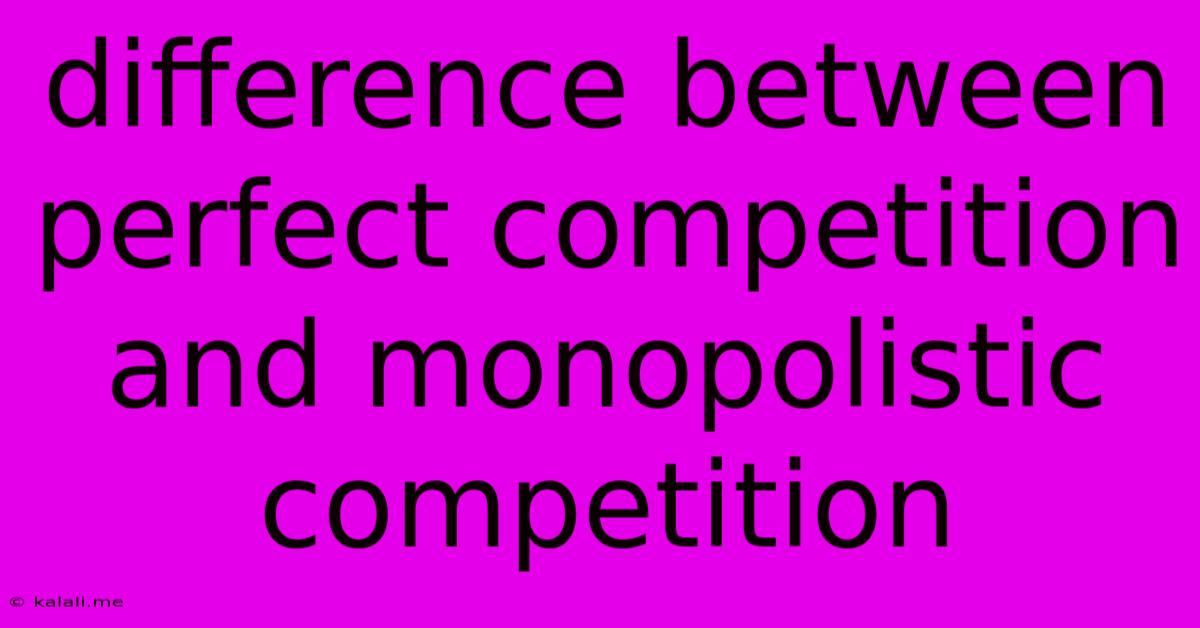Difference Between Perfect Competition And Monopolistic Competition
Kalali
Jun 15, 2025 · 3 min read

Table of Contents
Perfect Competition vs. Monopolistic Competition: Unveiling the Key Differences
Understanding the nuances between different market structures is crucial for any aspiring economist or business strategist. This article delves into the key distinctions between perfect competition and monopolistic competition, two common market models, highlighting their characteristics, implications, and real-world examples. Understanding these differences will help you better analyze market dynamics and predict business outcomes.
What is Perfect Competition?
Perfect competition represents a theoretical ideal market structure characterized by several key features:
- Many buyers and sellers: A large number of participants ensures no single entity can influence market price.
- Homogenous products: Goods offered are identical, making them perfect substitutes for each other. Think commodities like wheat or gold.
- Free entry and exit: Businesses can easily enter or leave the market without significant barriers.
- Perfect information: All buyers and sellers possess complete knowledge of market prices and product characteristics.
- No control over price: Individual firms are price takers, meaning they must accept the prevailing market price.
In a perfectly competitive market, firms earn only normal profits in the long run, meaning they cover all their costs, including opportunity cost, but don't generate excessive returns. Competition is fierce, and firms constantly strive for efficiency to survive.
What is Monopolistic Competition?
Monopolistic competition sits between perfect competition and monopoly. It shares some characteristics with perfect competition but introduces key differences:
- Many buyers and sellers: Similar to perfect competition, there are numerous participants.
- Differentiated products: Products are similar but not identical. Differentiation occurs through branding, advertising, quality variations, or slight feature adjustments. Think of the coffee shop market – many shops offer coffee, but each brand creates a unique customer experience.
- Relatively easy entry and exit: While easier than in a monopoly, barriers to entry might exist, such as the need for brand recognition or initial investment.
- Some control over price: Firms have a degree of pricing power due to product differentiation, allowing them to charge slightly higher prices than competitors.
- Non-price competition: Firms engage in advertising and marketing to enhance brand image and attract customers.
Key Differences Summarized:
| Feature | Perfect Competition | Monopolistic Competition |
|---|---|---|
| Number of Firms | Very large | Large |
| Product Type | Homogeneous (identical) | Differentiated |
| Entry/Exit Barriers | None | Relatively low |
| Price Control | None (price takers) | Some (price makers, within limits) |
| Non-Price Competition | None | Significant (branding, advertising) |
| Long-Run Profits | Normal profits | Normal profits (often lower than monopolies) |
Real-World Examples:
- Perfect Competition (approximation): Agricultural markets (e.g., wheat, corn) often come close to perfect competition, although variations in quality and geographical location can introduce some differentiation.
- Monopolistic Competition: The restaurant industry, clothing stores, and hair salons are classic examples. Each business offers similar products but differentiates through branding, location, service, and other factors.
Conclusion:
While perfect competition serves as a theoretical benchmark, monopolistic competition represents a more realistic depiction of many markets. Understanding these differences is vital for businesses to develop effective pricing strategies, marketing campaigns, and overall business models. By analyzing the specific characteristics of their market, businesses can better position themselves for success.
Latest Posts
Latest Posts
-
A Homogeneous Mixture Of Two Or More Substances Is A
Jun 15, 2025
-
Which Of The Following Statements Is True Of Combination Skin
Jun 15, 2025
-
Where Does Meiosis Occur In Flowering Plants
Jun 15, 2025
-
The Rate Of Change Of Velocity Is Called
Jun 15, 2025
-
Which Of The Following Is True Regarding A Series Parallel Circuit
Jun 15, 2025
Related Post
Thank you for visiting our website which covers about Difference Between Perfect Competition And Monopolistic Competition . We hope the information provided has been useful to you. Feel free to contact us if you have any questions or need further assistance. See you next time and don't miss to bookmark.